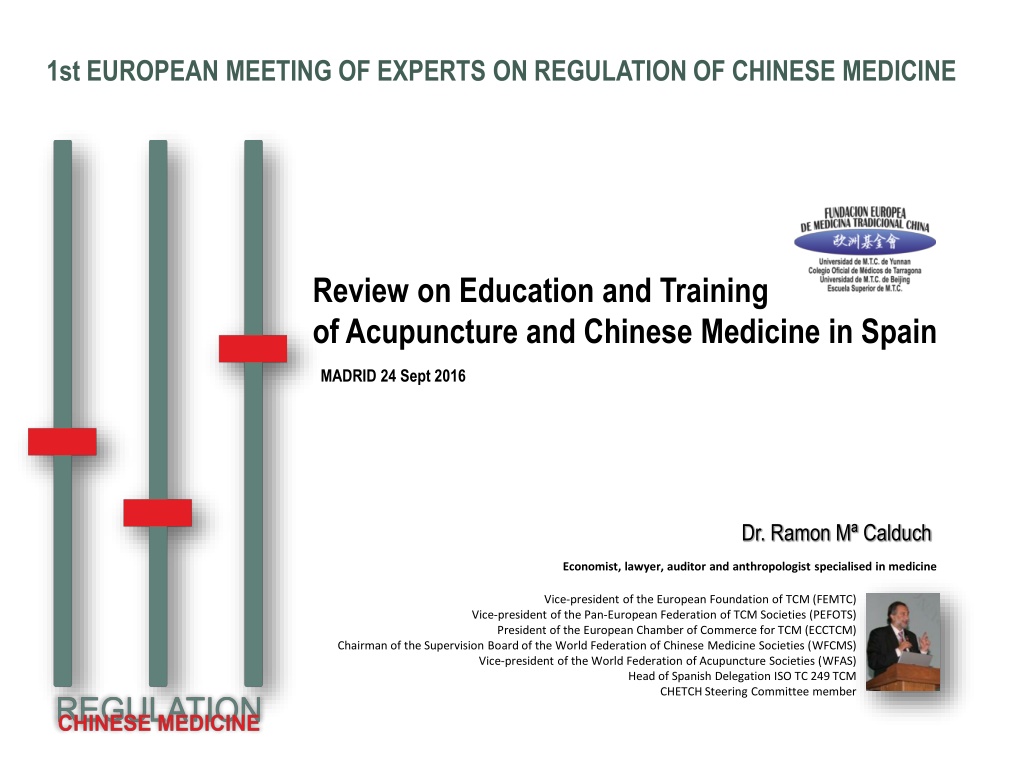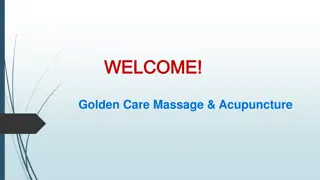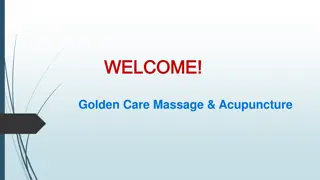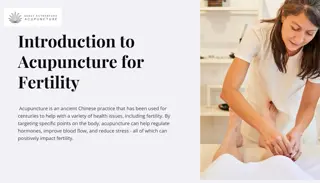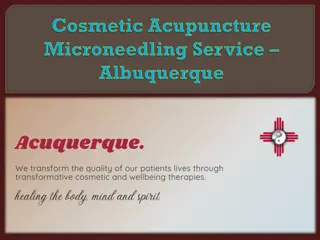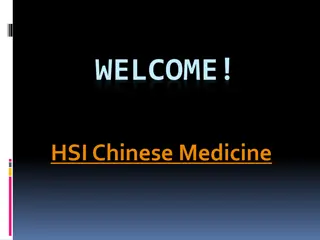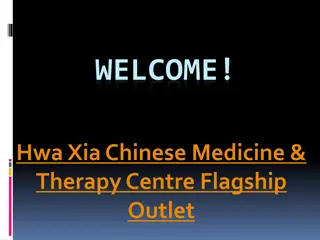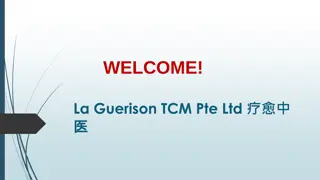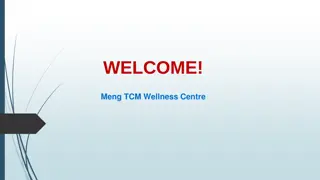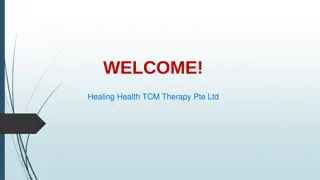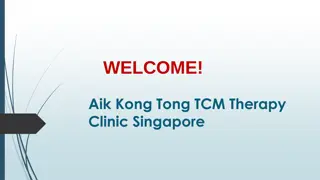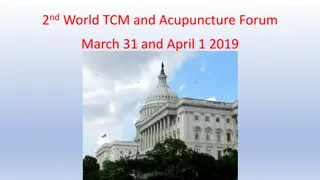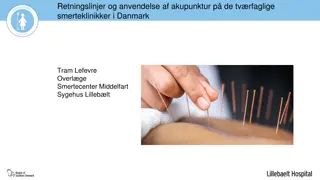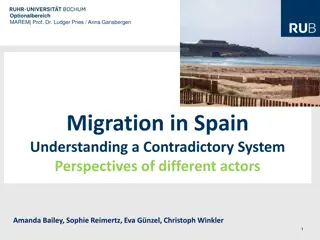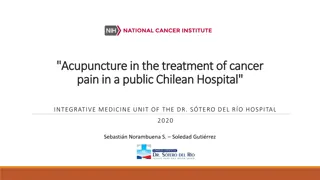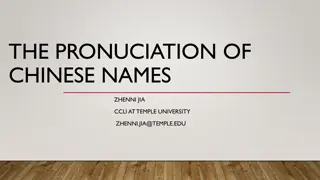Regulation of Acupuncture and Chinese Medicine in Spain: Current Status
Spanish legislation lacks comprehensive regulation for the practice of acupuncture and traditional Chinese medicine (TCM). While natural medicine was partially addressed in a 1926 Royal Order, specific regulation for TCM remains absent. Decree 1277/2003 mandates certain requirements for health professionals engaging in non-conventional therapies, such as acupuncture. The existing framework classifies TCM practitioners under various categories with distinct regulatory implications, leading to a fragmented landscape with varying levels of oversight.
Download Presentation

Please find below an Image/Link to download the presentation.
The content on the website is provided AS IS for your information and personal use only. It may not be sold, licensed, or shared on other websites without obtaining consent from the author. Download presentation by click this link. If you encounter any issues during the download, it is possible that the publisher has removed the file from their server.
E N D
Presentation Transcript
1st EUROPEAN MEETING OF EXPERTS ON REGULATION OF CHINESE MEDICINE Review on Education and Training of Acupuncture and Chinese Medicine in Spain MADRID 24 Sept 2016 Dr. Ramon M Calduch Economist, lawyer, auditor and anthropologist specialised in medicine Vice-president of the European Foundation of TCM (FEMTC) Vice-president of the Pan-European Federation of TCM Societies (PEFOTS) President of the European Chamber of Commerce for TCM (ECCTCM) Chairman of the Supervision Board of the World Federation of Chinese Medicine Societies (WFCMS) Vice-president of the World Federation of Acupuncture Societies (WFAS) Head of Spanish Delegation ISO TC 249 TCM CHETCHSteering Committee member
FRAMEWORK FOR THE PRACTICE OF CHINESE MEDICINE
The legal basis for the practice of natural medicine in Spain was established by the Royal Order of the Ministry of the Interior, published in the Official Gazette of March 26, 1926. This order provided that the profession of Naturopathic was reserved to doctors as a special branch of medicine and that in no case there might be naturist consultations not addressed by doctors. Apart from this Royal order, there is no specific legislation statewide that regulates natural therapies globally. At the level of the autonomous communities, only Catalonia drew up a concrete rule to regulate these Resultado de imagen de regulation therapies, which is currently invalid .
Resultado de imagen de regulation To date there is no regulation in Spain regarding acupuncture / TCM, beyond what is regulated by Decree 1277/2003 for health professionals, the tax registering and the sector agreement for non-health practitioners (paramedical services) who practice them. As there is no specific regulation on training or certification of persons applying for Chinese medicine, actually health professionals and non-health professionals who perform it coexist.
Resultado de imagen de regulation For healthcare professionals, the Decree 1277 / 2003 establishes, in its classification of health centers, health care unit U101 (non-conventional therapies), which requires that the director is a Western doctor. As a result, health professionals who are not physicians, must exercise acupuncture/TCM as paramedics or be under the direction of a Western doctor. For those who are not health professionals, regional health authorities (which are those who have the powers of inspection in the field) are aware that there are centers and no sanitary facilities, legally established, which "lack of regulatory rules governing specific health care unavailable at state as well as at regional level.
Resultado de imagen de regulation The non-health professionals of Chinese medicine are registered in the corresponding Social Security regime and obtain the tax license as paramedical professionals related to paramedical activities (naturopaths, acupuncturists and other paramedical professionals), covered in the Royal Decree 1175/1990, of September 28, which approve the rates and the instruction of the tax on economic activities, which includes in its Annex 1, as economic activity in the Group 944: services of naturopathy, acupuncture and other paramedical services, and as a professional activity in the group 84, professionals related to paramedical activities, of the Group 841: naturopaths, acupuncturists and other paramedical professionals. It is also established (in several judgments of the Supreme Court and various provincial courts) that the practice of acupuncture / TCM cannot accommodate the crime of intrusion, when performed by non-health professionals, for lack of evidence of "own acts."
Resultado de imagen de regulation On 11 December 2007, the Commission for Health and Consumption of the Congress of Deputies, agreed to approve a non-legislative motion for the creation of a working group between the Ministry of Health and Consumer Affairs and the autonomous communities to promote a joint reflection to be concluded with a report, for the purpose of the future regulation of natural therapies in Spain.
In March 2006, the Ministry of Health presented the draft of the decree which intended to regulate the conditions for the exercise of certain natural therapies in Catalonia. This decree was intended to establish the conditions for the exercise of natural therapies, which were classified into four - acupuncture and related Oriental therapies (Chinese medicine), naturopathic therapy, homeopathic therapy. The decree regulated the structural requirements and equipment that had to be met, the staff accreditation requirements, as well as the training and assessment of their competencies, the requirements for authorization of natural therapies training centers, and the regime of control and sanctioning in this area. This decree would also include a register of approved training centers and professional. manual therapy and techniques, L'Institut d' Estudis de la Salut (IES, Institute of Health Studies) was the entity of the Department of health which had enjoined the certification of competence of future non health professionals or "practitioners" or those who were already active, and therefore it was the IES to whom it was delegated the responsibility of the evaluation process and accreditation, in collaboration with experts among whom there were some members of the Escuela Superior de TCM which is part of the European Foundation of TCM. The Decree 31/2007 which is regulating the conditions for the exercise of certain natural therapies was published in Diari Oficial de la Generalitat de Catalunya No. 4812 on February 1, 2007. In June 2009 the High Court of Justice of Catalonia annulled the decree considering that it violated the state law in the field of health. The Court found that the Decree recognized "the pursuit of health activities to non-health professionals and non-health establishments".
Resultado de imagen de acupuntura CHINESE MEDICINE IN PUBLIC HEALTH
Chinese medicine and acupuncture therapies are not funded by the public health system. However, in the case of acupuncture there are several units of acupuncture in hospitals and primary care centers. As an example, in 2005 there were 12 units in Andalusia, which regularly applied acupuncture; half were located in the hospital environment and the other half in the centers of health.
Resultado de imagen de acupuntura TRAINING AND CERTIFICATION
University education in Spain is regulated by the law 4/2007, of 22 April, on structuring of the teachings and university degrees, amending the organic law 6/2001, of 21 December, on universities. It is carried out by means of Royal Decree 1393 / 2007, of October 29, which, in turn, has been modified by Royal Decree 861/2010 of 2 July, which establishes the management of higher education in health. The universities offer degree, master and doctorate education, leading to the obtaining of the corresponding official titles. Regulated College titles have official character and validity throughout the national territory, with full academic effects and enable to carry out regulated professional activities, according to the regulations resulting from application in each case.
The curricula of degree have 240 credits and the conducive to obtaining the Master's degree have between 60 and 120 credits. To access the official teachings of master it is necessary to be in possession of an official Spanish university degree, or one issued by a higher education institution belonging to another State member of the European space of higher education entitling to access to the teachings of master. The curriculum developed by the University must be verified by the University Council and subsequently sent to the ANECA for the purposes of the preparation of the assessment report, which has mandatory and decisive character and is expressed, in terms of favorable or unfavorable.
Resultado de imagen de regulation Moreover, the postgraduate training of the health specialists is regulated by Royal Decree 183/2008, of February 8, by which the specialties in Health Sciences are defined and classified and certain aspects of the specialized training in the healthcare system are developed. On the other hand, specialized health postgraduate training is regulated by Royal Decree 183/2008, of 8 February, which determines and classify the specialties in health sciences and develop certain aspects of the system of specialized health training.
Aside from the health professions entitled and regulated which referred to article 2 of the LOPS, article 3 refers to "they are health professionals belonging to the vocational training who hold the titles of vocational training of the health professional family, or titles or certificates equivalent to them." Top grade and middle grade professionals "shall, in addition, be regarded as vocational training health professionals who are in possession of certificates of vocational training which, in the professional family health, establish the General Administration of the State in accordance with article 10(1) of law 5/2002 of 19 June, Qualifications and vocational training".
Studies of Chinese Medicine and Acupuncture
The Spanish Ministry of Education and Science considers the studies of Chinese medicine and acupuncture as non-regulated (not approved) and as such do not have official recognition, although they are supported by national or foreign universities. The formation of Chinese medicine is provided in many different institutions: universities, private colleges, professional bodies, academies, etc., both undergraduate and postgraduate or master's degree and addressed both to health as non-health professionals.
In conclusion, on the one hand there are health care workers who may have received training in acupuncture in: Various Spanish universities that offer acupuncture training courses for physicians and / or other health care professionals. Private colleges that provide courses for health and non-health professional Other organizations, as associations of physicians or physiotherapists On the other hand, there are non-health professionals who have acquired their knowledge through media or higher studies not regulated, nor validated in Spain by that lack of approved health evidence.
ASSOCIATIONS OF PROFESSIONALS OF CHINESE MEDICINE
1. Asociacin de Acupuntores de Madrid [Association of Acupunturists of Madrid] (Asociaci n Colegial de M dicos Acupuntores del Ilustre Colegio de M dicos de Madrid), www.acupunturacma.org 2. Practitioner s Register (Asociaci n de Acupuntores y Profesionales de Medicina China [Association of Acupuncturists and Professionals of Chinese Medicine]), www.practitioners.mtc.es 3. Sociedad de Acupuntura M dica de Espa a [Society of Medical Acupuncture of Spain], SAME; www.same-acupuntura.org 4. Sociedad de Acupuntores de Catalunya [Society of Acupuncturists of Catalonia], SAC; www.sac-ae.com 5. Sociedad Espa ola de Acupuntores Profesionales [Spanish Society of Professional Acupuncturists]; www.sociedadespa oladeacupuntores.es
HEALTH PROFESSIONALS Resultado de imagen de acupuntura
Aside from registered and regulated health professions are the health area of vocational training professionals, who are those who hold the titles of vocational training of the health professional family, or titles or certificates equivalent to them. This requires the existence of a professional qualification in the national catalogue of professional qualifications, in the professional health family. The creation of a qualification is set based on a proposal of the National Institute of qualifications Resultado de imagen de regulation (INCUAL).
In Spain, the exercise of physicians, pharmacists, dentists, veterinarians, nurses and midwives is subject to the provisions of Directive 2005/36 / EC of the European Parliament and of the Council of 7 September 2005 on the recognition of professional qualifications, which has been transposed into the legal system by means of the Royal Decree of 1873/2008, of 8 November. They are professions that are considered as "regulated", that is, according to article 3 of this regulation, those professional activities whose exercise is subordinated, legal or administrative provisions to the possession of diplomas and certificates issued by the competent authority.
Law 44/2003, of 21 November, on the management of the health professions (LOPS, for its acronym in Spanish), contains the basic regulation with regard to the professions and health professionals. Although the LOPS throughout its articles refers generically to health professionals, it is important to distinguish, first, between titled and regulated health professions (article 2 of the LOPS) and professionals in the health field of vocational training (article 3), as well as characteristics and formation of each type. To date no university degree or vocational training or professional qualifications in the health professional family for Chinese medicine or other natural therapies have been developed.
Titled and regulated health professions
In its article 2, the LOPS establishes what these entitled and regulated health professions are: Those whose undergraduate or specialized training is aimed specifically and primarily to provide stakeholders in the knowledge, skills, and attitudes of health care, and are organized in professional associations officially recognized by public authorities, in accordance with the specific provisions of the applicable rules .
And then lists them, dividing them into two large groups: level degree and diploma level and adds the dental technician and dental hygienist. The functions of these professionals are developed in articles 6 and 7 of the LOPS, which lays down what are the functions of each of the health professions, various professions-specific features, so for its exercise is required to be in possession of the corresponding qualification.
Aside from the professions listed in the LOPS, article 2 provides that: When so required by the characteristics of the activity, to improve the efficiency of health services or for preventive or health care structure to scientific and technological progress, may formally declare the nature of healthcare profession, entitled and regulated, of a particular activity not provided for in the preceding paragraph, using standard of legal rank. These would be activities not included in the health professions (neither those for which enabled titles of Bachelor or diploma nor those for which the health sciences specialist have to qualify).
Specialist degrees in health sciences Within the health professions, Article 2.2 of the LOPS includes both the graduate and the diploma level, those for which the official degrees of Specialist in Health Sciences under Title II level qualify. Within the health professions, article 2(2) of the LOPS includes, both the Bachelor and the diploma level, those for which the official titles of specialist health sciences concerning the title II are qualified. Article 16 provides, in relation to the titles of specialists in Health Sciences, that: "Corresponds to the Government, the establishment of specialist health sciences titles, as well as its abolition or change of name, on the proposal of the ministries of education, culture and sport, and health and consumption, after the report of the Committee on human resources of the national health system, of the National Council of specialties in the health and sciences organization or college organizations that apply the establishment of specialist health sciences titles, as well as its abolition or change of name".
Specialist degrees in health sciences These degrees may be established (Article 19) to in Articles 6 and 7 expressly referred professionals and also . "To other university graduates not mentioned in the above precepts, when their undergraduate training suits to the professional field of the specialty. (...) The Government, by establishing specialist qualifications in Health Sciences will determine the title or titles needed to access each of the specialties and the trunk in which, where appropriate, they are integrated ". The existence of a specialist degree in health sciences implies, therefore, that of a qualified and regulated health profession.
Specific TrainingAreas As part of the specialized training in health sciences, the LOPS envisaged in article 24 that specific training areas (STA), may be in one or more specialties in health sciences, using the same procedure followed to set a qualification for specialist. In case for an STA in one or more specialties, it will be necessary to be in possession of the Diploma of STA in order to use the designation of specialist with area-specific training. As regards the training in an STA, the LOPS points out that: "According to the rules will be established the assumptions and requirements so that specialists in health sciences can access the diploma of specific training area, provided that the area had become the corresponding specialty and they prove at least five years of practice in the specialty.
Specific TrainingAreas. The access to the indicated diploma may occur through scheduled training, or through specifically oriented to the corresponding area, accompanied by teachers or students continued training activities in that area, and, in any case, after the evaluation of the professional competence of the person concerned in accordance with the requirements referred to in article 29 . professional practice The LOPS establishes, therefore, the possibility of a Diploma from STA which is obtained via a scheduled training or professional practice of the specialist in the area in question.
Accreditation certificates and Diplomas of advanced accreditation Finally, in the training of professionals, the LOPS foresees the possibility of sanitary authorities issued certificates of accreditation (DA) and advanced accreditation (DAA) "to certify the level of training achieved by a professional in a specific functional area of a certain profession or specialty, based on accredited continuing education activities developed by the interested party in the corresponding functional area . The training giving access to the DA and DAA must be accredited according to the requirements, procedures and criteria established by the Committee on continuous training of the health professionals. Although the LOPS does not designate it specifically, it seems that the DA and DAA are established for the health professions listed in article 2, and not for the professionals of the health area of vocational training. Therefore, one should be in possession of evidence from those laid down in article 2 to be eligible for training using a DA or DAA, would be an additional training for those professions.
Professionals of the health area of vocational training
The Article 10.1 of the organic law 5/2002 states that the General Administration of the State shall determine the professional titles and certificates, which will constitute vocational training offers relating to the national catalogue of professional qualifications. To create a vocational qualification of the professional family in the health area, in summary, requires the following: The existence of a professional qualification in the National Catalogue of Professional Qualifications, in the professional health family. The creation of a qualification is set based on a proposal of the National Institute of Qualifications (INCUAL). The INCUAL carries out its activity through groups of experts, of the corresponding professional family. These groups made proposals of qualifications that are subjected to external contrast, process involving the main actors linked to each professional family: organizations business and trade unions, the General Administration of the State and the autonomous community administrations, as well as other entities and significant professional associations. Once there is a vocational qualification, the creation of a title of vocational training can be started.
There have been in the General Sub-Directorate of professional management of the Ministry of health, Social policy and equality, to perform the external contrast, proposals of the INCUAL for the following professional qualifications: competence would be "operations of sale of herbs and dietetic products, cosmetic and hygiene products, informing and guiding the user about its properties and use; disseminating healthy lifestyle habits, collaborating in the promotion of health in a natural manner; report on diets with herbal and dietetic products, tailored to specific needs; manage an establishment related to this activity, as well as participate in the development and industrial production of new products of herbal and dietetic products, in accordance with technical sanitary standards applicable". Herb and dietetic specialist [Herbodiet tica], whose general
techniques. The professional competence consists of "natural therapies of therapeutic massage, reflexology techniques and appliances associated to improve the physical and mental condition of persons upon requirements of the physician, in an autonomous and responsible manner and according to protocols designed according to an evaluation with naturist criteria, fulfilling sanitary standards of quality, health and safety and environmental regulations". Manual massage, lymphatic drainage and reflexology lymphatic drainage, whose competence consist in "applying independently and responsibly the natural and bioenergetic therapies upon the requirements of a physician, according to designed protocols based on an assessment with naturist criteria, meeting the technical and health standards of quality, health and safety and environmental force to improve physical, bioenergetics and mental condition of the persons." Therapies based on manual and bioenergetic techniques, noninvasive techniques of
The three qualifications will be assigned to the professional health family, with level 3 qualifications, equivalent to the title of technician. However, the degree of professional autonomy seems to be higher in the case of the qualification in herbs and dietetics [Herbodiet tica], which gives capacity to manage a settlement, while in the other two qualifications related to manual therapies, the application of specific techniques requires prior prescription of the physician.
Its potential development will have to be subject to further analysis, and in-depth training that should have no health professional of natural therapies, then assessing the level of qualification required practicing independently. This analysis is necessary, in addition, from the perspective of the practice of these therapies by health professionals, in the sense of rating what would be the level of qualification and training required in your case.
On the other hand, on September 29, 2009, the Committee on health and consumption of the Congress of Deputies approved a proposal of a bill that urges the Government to take the necessary measures so that the exercise of homeopathy is exclusively performed by graduates in medicine and surgery and homeopathic medicinal products with therapeutic indication is exempt in pharmacies.
Resultado de imagen de HOSPITAL THE PRACTICE OF CHINESE MEDICINE IN HEALTH AND NON-HEALTH CENTRES
The only regulation applicable to centers where Chinese medicine is done at the State level is the Real Decree 1277 / 2003 of 10 October, which lays down general bases on authorization of centers, health services and facilities, which includes the health care unit U.101 - Non-conventional therapies defined as: care unit in which a physician is responsible for treatment of diseases by means of naturopathic medicine or homeopathic medicines or techniques of peripheral stimulation with needles or others that demonstrate its effectiveness and safety.
The Autonomous Region having more authorized care units U.101-non-conventional therapies, in application of the Real Decree 1277 / 2003, is Andalusia with 59 centers, followed by Basque country with 37. There are any centers of natural therapies in any other autonomous community. The Autonomous Communities have developed standards such as the development of the before mentioned Royal Decree 1277 / 2003, by which only regulate conditions of authorization as health centers when there is a doctor at the front.
There is a high number, though not quantified, of Chinese medicine centers without health authority where non-health professionals are exercising. Such centers do not have today specific health related regulations. The actions carried out in non-health centers are considered a commercial service without purpose of restoring health and treatment of diseases. Therefore, if the premise of these centers is to develop therapeutic or curative activities, they shall proceed to its legalization as health centers.
There is a large, although not quantified, number of Chinese medicine centers without sanitary authorization where non- health professionals are exercising. These centers do not have today specific health regulations. The actions that are not health conducted in centers are considered a service of a commercial nature without purpose of restoration of health or treatment of diseases. Therefore, if in such centers one would develop therapeutic or curative activities, one must proceed to obtain its legalization as health centers.
Four autonomous communities (Catalonia, Madrid, Murcia and La Rioja) indicate that they have rules, as well as the Royal Decree 1277 / 2003, which regulates the centers that perform Chinese medicine, but actually, these rules are developing the aforementioned Royal Decree, except in the case of Catalonia, which did have a specific standard (currently cancelled and confirmed its annulment by the third Chamber of the contentious-administrative of the High Court on 7April 2011).
COMMERCIALIZATION OF CHINESE HERBAL MEDICINE
Resultado de imagen de regulation The use of medicinal plants is regulated by the law 29/2006, of July 26, guarantees and rational use of medicines and health products, and by the Royal Decree 1345 / 2007 of 11 October, which regulates the procedure for authorization, registration and dispensation of industrially manufactured medicaments for human use.
Resultado de imagen de regulation Article 51 stipulates that the Ministry of Health and Consumption (current Ministry of Health, Social Policy and Equality) will establish a list of plants whose sale to the public will be restricted or banned because of their toxicity, and that there are plants which may be sold freely to the public traditionally regarded as medicinal plants and offered without reference to the therapeutic, diagnostic or preventive properties, being forbidden its itinerate trade.
The Royal Decree 1345 / 2007 dedicated section 4th to the traditional herbal medicines: On the one hand, this Royal Decree establishes the obligation of registration of traditional medicines based on plants, the criteria that they must met in order to register for the simplified procedure, the simplified registration procedure for traditional herbal drugs, the causes for denial of registration and the withdrawal from the market when a substance, prepared plant or combination of plants ceases to be included in the list drawn up by the Committee of herbal medicines of the European MedicinesAgency.
